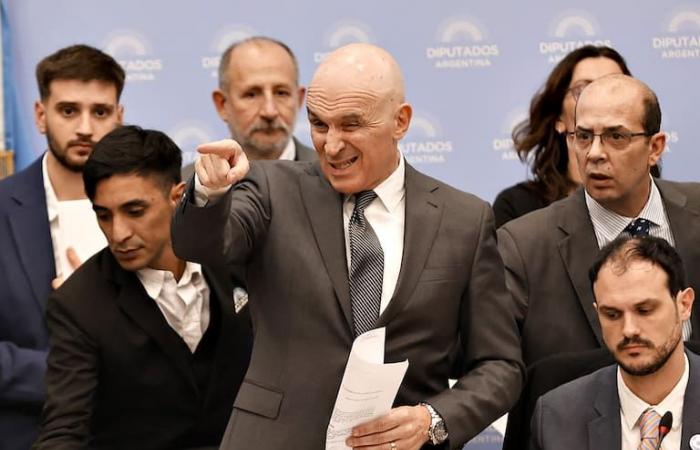
Hear
He Government and the blocks of dialogic opposition This afternoon they reached a agreement for which The Chamber of Deputies will accept the modifications introduced by the Senate to the project of Base Law two weeks ago. Among those changes is the exclusion of Argentine Airlines, Argentine Mail and Argentine Radio and Television (RTA) of the payroll of public companies to be privatized.
This agreement was crystallized this afternoon, in a meeting between the deputy chief of staffJosé Rolandi; the Secretary of Strategic Planning, Maria Ibarzabal Murphy, and the representatives of the Pro blocks, the UCR, We Make the Federal Coalition and Federal Innovation. Later, this agreement was reflected in a majority opinion signed in the General Legislation and Budget commissions: The text obtained 66 signatures. The Union for the Homeland and the Left Front blocs did not sign the opinion, nor did the socialist Mónica Fein.
The intention of the ruling party is to take this opinion to the House of Representatives the day after tomorrow. To do this, he called a special session at 12.
The exclusion of Aerolíneas Argentinas, Correo Argentino and RTA from the list of companies to be privatized continues to be a reason, however, for differences between the blocks. In case, the Pro bench will sign the opinion in dissent considering that these three companies should pass into private hands, announced the deputy Silvana Giudici.
“We do not agree that the Chamber of Deputies cannot insist on the privatization of Aerolíneas Argentinas. We believe that this law is an opportunity to move forward in that sense,” said Giudici, who recalled that this airline company has $7.5 billion deficit. “Those who say they are so concerned about retirees and the most vulnerable sectors, know that part of this deficit was financed by the Sustainability Guarantee Fund,” he stated.
Giudici responded to Nicolas Massotfrom We Make the Federal Coalition, who minutes before had argued that the Chamber of Deputies does not have the power to insist on the privatization of these three companies because the Senate ruling party decided to withdraw it from treatment before the general vote.
“They were excluded [durante el debate en el Senado] by Javier Milei’s own government of the list of companies to be privatized: this was part of an agreement to reach the quorum in the Senate. We claim the value of agreements“Massot said.
From the Civic Coalition, the deputy Juan Lopez He anticipated that his party will also sign the opinion in dissent. “This legislative product is more reasonable than the original [en alusión a la media sanción de Diputados] -held-. We are facing a project that has two half sanctions; The deputies present here have to choose between one of the two alternatives. Even with our criticisms, We believe that some of the modifications introduced by the Senate are reasonable, such as the limitation to the incentive regime for large investments, the RIGI. From the beginning we voted against the delegation of powers to the Executive Branch, that is why we are going to sign this opinion in dissent.”
The representatives of Union for the Homelandled by German Martinez, Not only did they express their rejection of the Base Law project and the modifications incorporated by the Senate, but they also predicted that the tax reform package – if approved this Thursday – He will end up prosecuted for his “unconstitutional vices.”
“This law [Bases] was tailored to a handful of economic sectors which are favored by the discretion contained in many of its articles. An absolutely flawed and arbitrary law, with an enormous number of signs of unconstitutionality, so surely its content will be taken to court”Martínez warned.
“This law is the product of enormous arbitrariness, of absolute opacity in the parliamentary process, of pressure of all kinds, of manipulations and various irregularities and of dark arrangements in the Senate. She is also the daughter of repression, when the initiative was debated in the Senate,” she emphasized.





